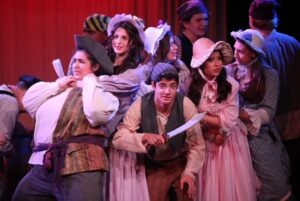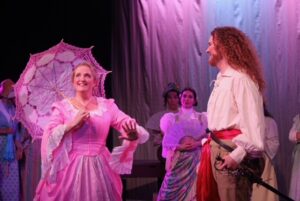from Franklin Light Opera
The Pirates of Penzance

It’s easy on the one hand to write off the dramatic merits of Gilbert and Sullivan’s operettas, especially when they’re compared against much of the rest of the standard operatic repertoire from the second half of the nineteenth century. But at the same time, their silliness and levity are real strengths of W.S. Gilbert’s dramatic sensibilities. His libretti present these humorous, somewhat thin dream worlds that gradually twist themselves into ever more convoluted knots. That these narrative knots are usually unceremoniously cut in two seemingly only because it’s time for the play to wrap up contributes to the sense that the stories themselves are hardly more than trifles.
But this sense of unreality allows his libretti a degree of thematic abstraction belied by this very unseriousness. The characters, plots, and settings come across as sketches or caricatures, but this enables them to work themselves out like the elements of a probing, pleasant dream. Patience, for example, satirizes both military bluster and a certain type of vain, pretentious artsy dandy. However, neither our “fleshly poet” Bunthorne nor Patience nor any of the dragoon guards ever feels any more human than is required for the particular dramatic moment. So Bunthorne is not really “a” poet dandy, but rather the ur-Poet Dandy in the complete abstract and likewise for the rest of the cast.

What’s more compelling than Gilbert’s topical satire of the mores of London’s youth in the 1880s is that the plot concerns specifically a contest for the hand and heart of Patience. The ostentatiousness of England’s military and imperial tradition here come into conflict with the exact type of sentimental, genteel enlightened individualism which was all along the object of its “civilizing” mission. If we find Gilbert’s resolution of this conflict silly or contrived, I think it’s because the strength of his libretto is that it finds an intuitive and comedic way to highlight this contradiction by following the thread of its own logic, rather than offering some kind of prosaic and hollow way “out” of the problem.
This same sensibility is even clearer in The Pirates of Penzance where the key to its understanding lies quite conspicuously in its subtitle, The Slave of Duty. Frederic finds himself humorously caught between his duty to the pirates who have raised him into adulthood and that of the upstanding, affluent world he wants so desperately to marry into. The specific logic of this snare is characteristically Gilbert-esque: the confusion of “pirate” and “pilot,” Frederic’s leap day birthday, etc., but the ironies run deep. The pirates, though uncouth, are loyal and honorable, refusing ever to harm an orphan, while Major-General Stanley and the police are cowardly and deceitful.
Even though I think the themes of Pirates are, on the surface at least, more readily obvious than those of Patience, Gilbert’s libretto wades into far murkier waters here. We encounter the same conflict between the old imperial guard and a competing social force seeking to replace it, with a distinctive mixture of sharp contrast and ironic equation (“That’s the Pirate King’s tune!” protests the Major General at the start of his own number). But unlike the figure of Bunthorne, whose point of reference is a bit more straightforward, the titular pirates seem at times to refer to England’s working underclass with Frederic struggling for his own class mobility, but might just as well seem to stand for the disruption in England’s social fabric presented by the industrial revolution, where the power of capitalists, which had up to this point long remained largely upon and across the sea, suddenly found itself come ashore.
It’s hard to say what to make of Gilbert’s resolution here, where the at the height of tension the pirates submit “in Queen Victoria’s name” and are allowed to marry into polite society. An obvious, superficial reading of the final scene would hold that the duty to the nation and to the crown supersede all others, in a kind of direct inversion of the nineteenth century Marxian argument that international working-class solidarity would eventually overwhelm any nationalist loyalty. But of course this final plot beat is played as tongue-in-cheek as the rest of the operetta, making it hard to take this moment at face value. This is why Gilbert’s silliness and levity are features and not bugs. Only in the unreality of a farcical dream world could a portrait of Queen Victoria possibly be enough to resolve intractable class conflict.

But I think this quality of Gilbert and Sullivan’s works accounts for more than just an analytic appreciation of their themes or subtext. Their abstraction is a particularly theatrical one, which like a magic trick turns even modest stagings into something joyful and wonderful. It’s no wonder these works have been staged consistently by companies of all sizes over the last century and a half.
I had exactly this quality of Gilbert and Sullivan’s in mind during the Franklin Light Opera’s recent production of Pirates. Even with little more than a fishing net and an accordion for nautical color, the production managed to evoke the setting and tone perfectly at a glance. Pirates of Penzance is at its best at its funniest, and the cast kept the crowd laughing the whole night, especially the posh bluster of Chad Jones’ Major-General Stanley and an especially charismatic and athletic performance by Andrew Hutton as the Pirate King.
The Williamson County Performing Arts Center is a smaller venue than others up the road in Nashville, with no place but the wings of the stage for a small pit ensemble. This made for a few practical issues for the FLO, namely questions of balance between acoustic instruments, the electric piano playing through the auditorium’s sound system, and the unmiked voices of the cast here and there, as well as a few moments where the pit and the cast found themselves unsynchronized—unfortunately most prominently on Friday night during the famous Major General’s number. That said the balance was perfect where it counted—most notably during Sullivan’s rapturous Mozartian ensemble writing at the end of the first act.
I have little doubt these technical faults were forgotten by the majority of the audience by the end of the performance, mostly because everyone seemed to be having so much fun. It’s community theater after all, and one gets the sense many or most of those in the crowd showed up to support family and friends in the cast, crew, or pit. Community theater, in its personal and local nature, too, has a way of transforming what might otherwise be limitations into strengths. Community Gilbert and Sullivan, then, is a perfect marriage of material and performing forces, and has me looking forward to the FLO’s production of Menotti’s Amahl and the Night Visitors later this year.



